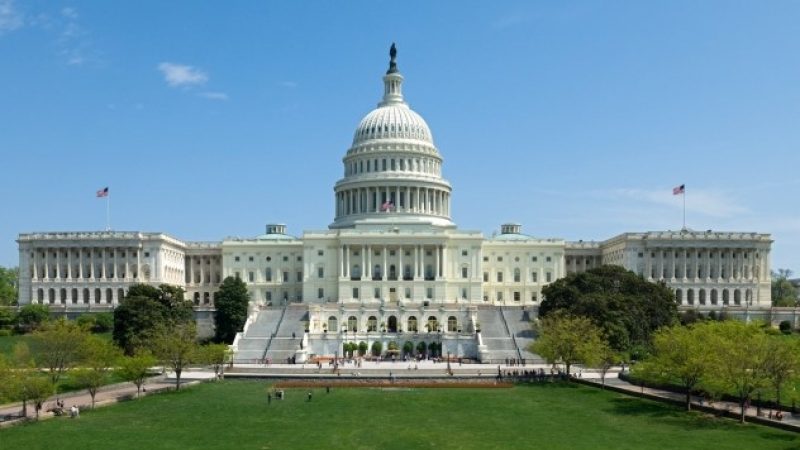Wisconsin’s six Republican members of Congress were among 59 in both chambers to oppose the sweeping $900 billion COVID-19 relief package tied to a $1.4 trillion omnibus spending bill passed by Congress late last night.
The delegation’s four Dems, meanwhile, each backed the package, which will fund the federal government through the first three quarters of next year and provide a host of coronavirus relief measures. Those include an extension of the Paycheck Protection Program and unemployment insurance, direct stimulus payments, rental assistance and a one-month extension of the eviction moratorium among others.
The bill now heads to President Trump, who is expected to sign it into law.
In the House, Wisconsin’s five Republicans were among a fractional minority as the chamber passed the package 359-53.
>> WisPolitics is now on the State Affairs network. Get custom keyword notifications, bill tracking and all WisPolitics content. Get the app or access via desktop.
Both U.S. Reps. Mike Gallagher, R-Allouez, and Tom Tiffany, R-Minocqua, cited frustration with the last-minute nature of the negotiations after the nearly 5,600-page legislation was unveiled to lawmakers yesterday afternoon, giving them just hours to review the package before voting. Gallagher noted in a statement the legislative text was “more than 1,000 pages longer than the entire Harry Potter series.”
“To state the obvious: no one knows what’s all in this bill because no one has actually read this bill,” Gallagher said. “And while there are no doubt long overdue and badly needed provisions — such as $28 billion to support the purchase and distribution of a vaccine — they make up an incredibly small fraction of the nearly $2.3 trillion in spending that we voted on this evening.”
Tiffany in a statement ahead of the vote indicated he would have supported the COVID-19 relief as a stand-alone bill. But he slammed the “last-minute, take-it-or-leave it” approach taken to negotiating the government funding package.
“What is happening in Washington has become an annual, instant-replay train wreck in the eyes of most Americans – whose elected representatives have little input on the debt being charged up on the nation’s credit card,” he said. “Americans deserve a real say in how their money is spent.”
On the other side of the aisle, U.S. Rep Gwen Moore said the final relief bill “is not perfect and falls short of the comprehensive package that I know is needed to address the financial insecurity millions are experiencing right now.” The Milwaukee Dem said among other things, she would have liked to have seen larger direct cash payments but still supported “the good faith bipartisan efforts that got us to this point.”
“I am prepared to keep working with my colleagues in the House and the new Administration to pass additional legislation that will put money in the hands of the American people and deliver other aid to individuals, businesses, and our communities that have been hit hard,” she said in a statement.
In the Senate, U.S. Sen. Tammy Baldwin backed the package while U.S. Sen. Ron Johnson voted against it as the chamber voted 92-6 in favor.
In a statement ahead of the vote, Baldwin, D-Madison, indicated she would support it because “Wisconsin needs help and it’s essential that Congress provide some now before the end of the year.”
“But our job is not done responding to this public health and economic crisis,” she said. “In January, we need to come back and start working together with the Biden Administration to provide federal support to Wisconsin that working families, our state, and local communities are going to need next year to get past this deadly pandemic and build back better.”
Meanwhile, Johnson cited similar concerns to those raised by his House GOP colleagues on only having hours to review the near 5.600-page text, which he labeled as a “monstrosity.” He also said he was worried about a rising deficit.
“While I am glad a government shutdown was avoided and that financial relief will finally reach many who truly need it, the fact that this dysfunction has become routine is the reason we are currently $27.5 trillion in debt,” the Oshkosh Republican said in a statement.
“We do not have an unlimited checking account. We must spend federal dollars — money we are borrowing from future generations — more carefully and place limits on how much we are mortgaging our children’s future.”
See the House roll call:
https://clerk.house.gov/evs/2020/roll251.xml
See the Senate roll call:
https://www.senate.gov/legislative/LIS/roll_call_lists/roll_call_vote_cfm.cfm?congress=116&session=2&vote=00289
See the WisPolitics.com press release page for more reaction:
https://www.wispolitics.com/category/press-releases/



